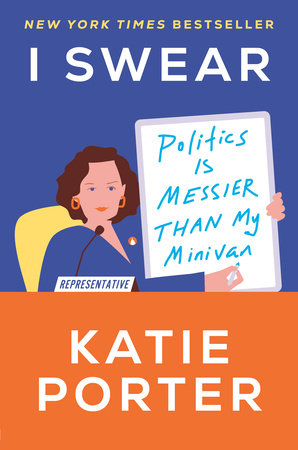I Swear Reader’s Guide
By Katie Porter


1. Would you characterize this as a political book? What were yourexpectations of an elected official, as compared to how Katie describes her political life?
2. What do you think of your Congressperson or Congress? What issues do they focus on? What issues should they focus on?
3. Katie’s kids call her “congressmom” but she gets called congressmanfrequently in Washington. How does Katie’s identity as a mother change when she campaigns and serves in Congress? Are her concerns those of a typical or atypical mother?
4. Of her upbringing, Katie says, “I grew up on a farm, a world where nearly everything required some effort. If I wanted something, I had to figure out how to get it.” Why do you think knowing our representative’s pastexperiences growing up is important? What are the benefits of sharing this with Americans?
5. “If you are under 40-years old,” Katie writes, “you have likely been told repeatedly and without solicitation that you need to find a mentor.” What has your experience been with mentorship, either being a mentor or a mentee? If you never had a mentor, how do you think one may have helped you? Do you think mentorship is overrated? Why or why not?
6. The book repeatedly talks about economic hardship, both as a personal issue for Katie growing up and as a political issue that cuts across thepartisan divide. What does a fair economy mean to you?
7. As a candidate running for Congress, Katie is advised to speak with vague pronouncements—buzz phrases—on the trail, rather than talking about anything specific. But we can! Take these two buzz phrases and drill down. What do they mean to you? How do you think they can beimplemented as laws?
“Comprehensive immigration reform.”
“Healthcare is a human right.”
8. What qualities do you look for in a candidate running for office, whether Congress or school board or trustee in your town? Why are these traits important?
9. Katie devotes a couple of chapters to the volunteers who went above and beyond, and sometimes over the line, in their enthusiasm. Where inyour life have you volunteered? When you volunteer, which nickname best describes your efforts: The Provider, The Coach, The Protector,The Energizer, The Organizer?
10. “In the House of Representatives,” Katie writes, “the privilege of wealth divides ruthlessly. Ideological differences might be the most visible to the public, but the class differences cut most sharply in our experiences.” Were you surprised that class differences cut deeper than ideological differences, especially between colleagues of the same Party? Why do you think the legislative body is full of the privileged? How would Congress change if it had more class equity among its members?
11. One of Katie’s chapters is “How to Whiteboard Anyone about Anything.” Okay, now’s your chance. What topic and questions would youwhiteboard the hell out of for your spouse, your kid, your supervisor?Explain yourself. Have fun.
12. Have you ever contacted your Congressperson? If yes, what was yourconcern? If not, and you were to pick up the phone tomorrow, what would you share?
Just for joining you’ll get personalized recommendations on your dashboard daily and features only for members.
Find Out More Join Now Sign In